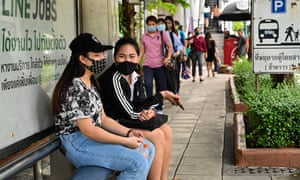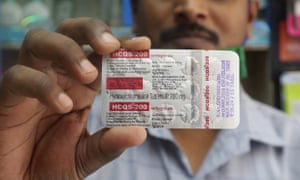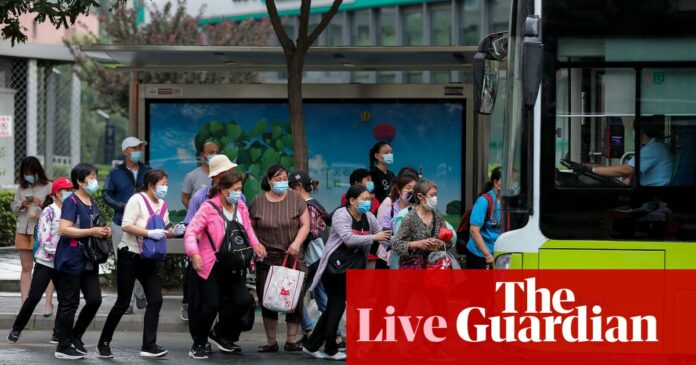The first trial results of a coronavirus vaccine being developed by CureVac in Germany are expected in two months, German news website Focus Online reported on Friday.
Reuters reports that CureVac, an unlisted German company, said this week that the first meaningful results could be available in September or October and, under favourable conditions, it could be approved by the middle of next year.
More on Curevac’s work from its own website here.
Public debt in UK exceeds 100% for first time since the 60s
Government borrowing in the UK in May is predicted to have hit 55.2 billion – nearly nine times higher than in the same month a year ago, according to the Office for National Statistics (ONS).
Office for National Statistics (ONS)
(@ONS)Borrowing was £103.7 billion in the financial year to date (April-May 2020).
This is £87.0 billion more than the same time last year and the highest in any April-May period since current records began in 1993 https://t.co/IOvjTgkff8 pic.twitter.com/enbRKMzgny
Public sector debt at the end of May 2020 was 100.9% of gross domestic product, the first time that debt as a percentage of GDP has exceeded 100% since the financial year ending March 1963, said the ONS.
The figure is slightly lower than the 62.1 billion of borrowing in April, according to the ONS, although the organisation also revised down that figure by 13.6 billion to 48.5 billion on Friday.
Reacting to this morning’s figures, UK Chancellor Rishi Sunak said they show “coronavirus is having a severe impact on our public finances”. He said:
The best way to restore our public finances to a more sustainable footing is to safely reopen our economy so people can return to work.
We’ve set out our plan to do this in a gradual and safe fashion, including reopening high streets across the country this week, as we kickstart our economic recovery.
Updated
India: Lockdown reimposed in Chennai
Indian officials have reimposed a lockdown in the southern city of Chennai and three neighbouring districts.
The BBC reports that only essential services and neighbourhood grocery shops will be permitted to function under the 12-day lockdown, set to end on 30 June.
Chennai is India’s sixth-largest city and the capital of Tamil Nadu state. It has more than 37,000 of Tamil Nadu’s confirmed 50,000 infections, making it one of India’s largest hotspots.
With just over 600 deaths in total, the state has a relatively low mortality rate – but its death toll is being reviewed after reports suggested that at least 200 deaths in Chennai were not included in the official tally.
It is the only city to reimpose a lockdown to curb the rise in infections.
India has the fourth-highest caseload in the world, with more than 350,000 confirmed cases of the disease. Daily reports of infections are increasing, with Tamil Nadu among the worst-affected states.
This is Alexandra Topping taking the reins of the global coronavirus liveblog for the next few hours. As ever, if you have tips or contributions to make – or you think we’ve neglected the news where you are, please do get in touch. My email is [email protected] and I’m @lexytopping on Twitter, my DMs are open.
Updated
That’s it from me, Helen Sullivan, for today. I leave you momentarily in the company of Armando Iannucci and his family, who are using lockdown to watch the film Cats five minutes at a time:
I’m at home with my wife, children and dogs. We’ve drifted into a communal understanding of watching something chewy, like Chernobyl, then Gogglebox. It ends with us doing impressions in very bad taste of Craig Cash: “In Kiev, there’s been an explosion in reactor four …” We’ve reached the gallows humour that I expect every family has reached as we hit week 13 of lockdown.
For some reason, Cats turned up unannounced on our Sky box. I’ve never been a party to that school of: it’s so bad, it’s good. But everything in Cats is so bad, from the scripts to the effects, we’ve had to restrict ourselves to five minutes a night, just to prolong the exquisite agony.
Updated
People in Singapore reunited with lovers and friends on Friday as the city-state lifted strict curbs on socialising, shopping and dining out after more than two months of lockdown amid the coronavirus pandemic, Reuters reports.
Many residents have been forbidden from mixing with those outside their families since early April under measures to contain infections that have topped 41,000 – one of Asia’s highest tallies.

Couple Tareesh and Phebe share a laugh after they are reunited after weeks of ciruit breaker lockdown in Singapore, 19 June 2020. Photograph: Edgar Su/Reuters
Jerry, 22, and his girlfriend, who had been apart for weeks, queued for bubble tea in a reopened neighbourhood mall at mid-morning.
“We came early. We wanted to avoid the crowds,” said Jerry, adding that the couple planned to spend the rest of the day at his home chilling out and catching up.
A nearby coffee shop serving kaya toast, or bread slathered with coconut jam and served with runny eggs, was full of masked patrons who had scanned QR codes on their telephones before entering, to help with contact tracing.
Some restaurants set up plastic screens between tables while retailers used yellow tape to keep people apart in long queues that formed outside their shops.
Thailand on Friday reported five new coronavirus cases, all of which were found in quarantine, making it 25 days without a confirmed domestic transmission of the virus.
The new cases were Thais returning from Saudi Arabia, said Taweesin Wisanuyothin, spokesman for the government’s Covid-19 task force.
Thailand has recorded 58 deaths related to Covid-19 among some 3,146 confirmed cases, of which 3,008 patients have recovered.

People wait at a bus stop in Bangkok on 18 June 2020. Photograph: Romeo Gacad/AFP/Getty Images
Life after lockdown on Germany’s Baltic coast
Paul Sullivan reports for the Guardian:
It’s the middle of June and it feels like a perfect summer day in Warnemünde. The pretty canal-side promenade is thronged with people eating fish and chips out of paper cones and gorging on soft Danish ice-cream (a speciality here). Gaudy tour boats drift breezily along the canal every few minutes, and shops selling everything from surfing gear and jewellery to locally made clothing have their wares out on show on the cobbled streets. The terraces of the town centre’s many cafes and fish restaurants also seem full, with people basking in the sunshine. The only obvious signs that the coronavirus is still with us are the masks worn by shopkeepers and service staff.
This small German town, officially part of Rostock, with its quaint fisherman cottages, striking 19th-century lighthouse and sweeping two-mile beach lapped by beautifully clear water, is one of many pearls strung along the country’s Baltic coast, or Ostsee (East Sea) as it’s known here. Part of Mecklenberg Vorpommern – one of Germany’s most popular states for domestic travel, thanks to a generous spread of forests, lakes and beaches – the town and broader region are now seeing the return of tourism after a couple of months described to me more than once as “catastrophic”.
Updated
Summary
Here are the most important recent developments in the global coronavirus pandemic:
- Global death toll from Covid-19 passes 450,000. The number of people who have lost their lives in the pandemic so far stands at 453,289, according to the Johns Hopkins University tracker. There are 8,464,739 known cases worldwide. Both figures are likely to be higher, due to differing testing rates and definitions, time lags and suspected underreporting.
- The US on Thursday questioned China’s credibility on reporting fresh coronavirus cases in Beijing and called for neutral observers to assess the extent of the outbreak. China has locked down the capital as it seeks to prevent a second wave of Covid-19, reporting 158 cases since a fresh cluster was detected last week. Secretary of state Mike Pompeo, an outspoken critic of China, urged greater transparency during talks Wednesday in Hawaii with senior Chinese official Yang Jiechi, as David Stilwell, the top US diplomat for East Asia who accompanied Pompeo, said “I would hope that their numbers and their reporting are more accurate than what we saw in the case of Wuhan and other places in the PRC, but that remains to be seen.”
- China publishes genome data for coronavirus behind new outbreak. China has published the genome data for the coronavirus behind the latest Covid-19 outbreak in the capital, Beijing, the website of state-backed National Microbiology Data Center showed on Friday. State-backed Beijing News also reported that the Chinese Center for Disease Control and Prevention submitted the genome sequencing data for the virus to the World Health Organization, which had previously sought access to the data.
- Tokyo lifts remaining business restrictions. Tokyo lifted all remaining restrictions on businesses on Friday, although officials urged caution over a possible second wave of the coronavirus. The measure, the final phase of a three-step easing of preventive measures in the Japanese capital, means live music venues, nightclubs and similar establishments where it is difficult to avoid the “three Cs” – closed spaces, crowded places and close contact – will be allowed to reopen with the blessing of local authorities.
- Anthony Fauci thinks return to full lockdowns is unlikely. The US does not require more widespread lockdowns to get its Covid-19 outbreak under control, despite the fact that the national daily infection rate is not showing signs of decline, leading government expert Anthony Fauci told AFP in an interview Thursday. “I don’t think we’re going to be talking about going back to lockdown,” he said when asked whether places like California and Texas that are seeing a surge in their caseload should reissue stay-at-home orders.“I think we’re going to be talking about trying to better control those areas of the country that seem to be having a surge of cases.”
- WHO eyes 2bn vaccine doses by end of 2021. The World Health Organization said Thursday that a few hundred million Covid-19 vaccine doses could be produced by the end of the year – and be targeted at those most vulnerable to the virus. The UN health agency said it was working on that assumption, with a view to two billion doses by the end of 2021, as pharmaceutical firms rush to find a vaccine. WHO chief scientist Soumya Swaminathan said researchers were working on more than 200 vaccine candidates around the world, including 10 that are in human testing.
- San Quentin: outcry after Covid-19 cases at California prison triple in two weeks. The number of coronavirus cases in California’s San Quentin state prison has tripled within the last two weeks, prompting advocates, families and attorneys to demand urgent action to fast track the release of prisoners and curb the spread among correctional officers. San Quentin, California’s oldest prison and home to the state’s only death row for male prisoners, reported its first batch of 15 positive cases on 3 June. Since then, that number has risen to 46. Organizers are pointing to the 30 May transfer of more than 100 incarcerated people from the California Institution for Men (CIM) in Chino as a catalyst for the spread of Covid-19 in the prison:
- India lifts export ban on hydroxychloroquine. India Thursday fully lifted an export ban on hydroxychloroquine, a drug favored by US President Donald Trump as a treatment against coronavirus, as questions remain over the malaria medicine’s effectiveness against Covid-19. The directorate general of foreign trade said in a notice that “hydroxychloroquine and its formulations” were now “free” to be exported.
- ‘Extensive testing’ in New Zealand has not uncovered new cases. Covid-19 testing of thousands of people in New Zealand has not uncovered any new cases, health officials say. The testing was undertaken after a quarantine bungle when two women were allowed out of managed isolation without being tested – and later turned out to have the coronavirus. Dr Ashley Bloomfield, the director-general of health, is giving a news conference in the capital, Wellington, during which he said the day of zero new cases of Covid-19 to report was “very reassuring”.
- Non-essential shops in Wales can reopen from Monday. All non-essential shops in Wales will be able to reopen from Monday so long as physical distancing can take place, as part of the devolved government’s cautious easing of lockdown restrictions.But the Labour-led administration is not expected to change its guidance that people should not travel more than five miles. The government will review the requirement to stay local by 6 July.
- Mexico confirms record new cases. Mexico’s health ministry reported on Thursday a record 5,662 new confirmed cases of coronavirus infections and 667 additional fatalities, bringing the total in the country to 165,455 cases and 19,747 deaths. The government has said the real number of infected people is likely significantly higher than the confirmed cases.
- Chinese medical expert says coronavirus under control in Beijing. “The epidemic in Beijing has been brought under control,” said Wu Zunyou, the chief epidemiologist of China’s Center for Diseases Prevention and Control, although he said the capital can still expect sporadic new cases. The city has recorded 158 infections since confirming the first on 11 June in its worst outbreak since early February, which has been traced to the sprawling wholesale food centre of Xinfadi in the south-west of the city.
Updated
Mallorca welcomes a more sedate breed of German tourist
Julia Macher reports for the Guardian from Palma:
During the morning at least, Palma’s S’Arenal beach and its six-kilometre stretch of sand still belongs solely to Mallorcans. Three women, all in late middle age, were admiring the turquoise waters of the Mediterranean as they jogged along the shoreline this week. “I’ve never seen the beach look so beautiful,” said Mercedes Blázquez. “The water’s like glass and the sand is just perfect.”
Her sister Lumi agreed. “It’s divine, and we have it all to ourselves,” she said.
Both work in hospitality, Mercedes in a hotel and Lumi in a bar, and they know how important tourism is to the economy of the Balearic islands. Even so, they can’t help relishing the tranquility that Spain’s strict Covid-19 lockdown has brought to the archipelago.
On Monday, thousands of German tourists began arriving on the islands as part of a pilot programme to reactivate Spain’s tourism sector. “If there are no tourists, there’s no jobs,” said Mercedes. “And without the Germans, there’s no work.”
It is no exaggeration. In 2018, 4.9 million Germany tourists visited the Balearics, more than from any other country. Not for nothing is Mallorca known as the 17th state of Germany.
Charities report rise in Maltese requests for abortion pills during lockdown
Lucy Mansfield
Women in Malta seeking an abortion during the pandemic are being forced to procure their own miscarriage or keep an unwanted pregnancy, even when the child has a severe abnormality.
Overseas charities have reported large increases in requests for abortion pills from women in Malta during the pandemic. Women On Web, an online community based in the Netherlands, received 45 pill requests in March and 47 in April, up from 18 in February, with three women who requested abortion pills saying they had been raped by their partner during lockdown.
Abortion Support Network, a UK-based charity, recorded an increase in requests from an average of seven a month before the pandemic to 13 each in March and April and 19 in May.
While Europe’s ailing south is calling for cash as soon as possible in the form of free grants and without demands of macroeconomic reforms, the more thrifty north only wants to allow conditional loans, AFP reports.
The east says too much money is being rerouted towards the south and want to maintain the earlier spending focus on agriculture and closing development gaps with the richer west.
The wealthy net payers, including Germany, want to retain budget rebates against the will of other EU states, and there is no agreement on how to eventually repay the Commission debt.
After the bloc’s initial response to the coronavirus exposed divisions over sharing of medical supplies and the issue of grants vs loans, EU leaders want a show of unity on Friday.
But they will need at least one or two more meetings in person next month to see if they can iron out the final deal, which would also mark a step towards more integration in the bloc after the damaging setback of Brexit.
European Union leaders hope to unite behind an unprecedented stimulus to inject billions of euros into their coronavirus-ravaged economies at a virtual meeting on Friday – but many fights still separate them from a final deal, AFP reports.
The 27 national heads join a video conference from 0800 GMT to discuss recovery for the bloc that has lost over 100,000 lives to Coovid19 and faces an unprecedented economic downturn threatening its stability and global standing.
Under discussion is the EU’s next joint budget worth more than €1tn ($1.1 trillion) for 2021-27, and an attached recovery fund that would be replenished by a proposed €750bn worth of historic borrowing by the executive European Commission.
The aid would be disbursed mainly among worst-hit nations, like Italy and Spain, but many differences must still be settled before the necessary unanimous agreement is in sight.
“We want at least to agree some basic elements of proposal … Time is of the essence and a final deal needs to be done in July, before the summer break,” said another senior EU diplomat.
A reminder that you can get in touch with me directly on Twitter @helenrsullivan, or via email: [email protected].
Questions, comments, jokes, news, and tips all welcome.
Updated
India lifts export ban on hydroxychloroquine
India Thursday fully lifted an export ban on hydroxychloroquine, a drug favored by US President Donald Trump as a treatment against coronavirus, as questions remain over the malaria medicine’s effectiveness against Covid-19.
The Directorate General of Foreign Trade said in a notice that “hydroxychloroquine and its formulations” were now “free” to be exported.

A chemist holds a pack of hydroxychloroquine tablets in Mumbai, India. Photograph: Rafiq Maqbool/AP
India accounts for 70% of global production of hydroxychloroquine, which is also used to treat lupus and rheumatoid arthritis.
India’s top biomedical research body has backed the use of the anti-malarial hydroxychloroquine as a preventive against coronavirus.
On Wednesday the World Health Organisation announced that hydroxychloroquine could be ruled out as treatment for hospitalised patients. But it recognised that ongoing trials may show that the drugs have some value as a preventative measure.






